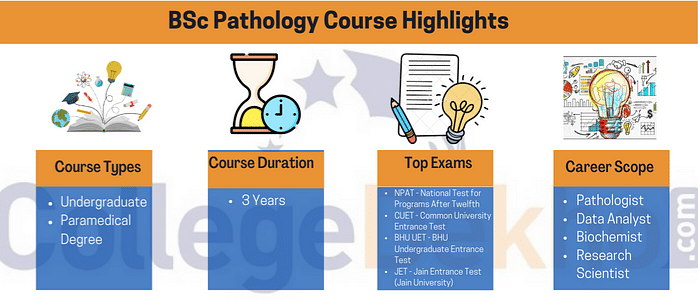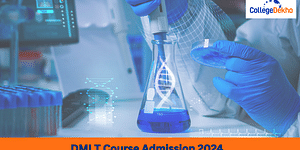BSc Pathology
BSc Pathology Course Overview
BSc Pathology is an undergraduate course designed to train students in the methods and processes of studying and understanding diseases and their causes. This three-year undergraduate course produces graduates who are crucial to the healthcare sector of a country. Generally, pathology study includes topics related to medicines, medical lab technologies, blood transfusion technology, and more.
Hundreds of universities and colleges across the nation offer students the opportunity to pursue the BSc Pathology course in India. Students have the option to choose between government and private universities and colleges for the course. Depending on the institution and other factors, candidates may be required to pay a tuition fee between INR 15,000 and INR 1,00,000 per year.
Primarily focusing on the science behind how pathogens, viruses and other organisms affect host organisms as well as how to control the diseases caused by them, the BSc Pathology course is designed to train students for a career in medicine. With the minimum requirement of passing the class 12 board exams in the science stream, BSc Pathology graduates will find themselves skilled and qualified for jobs in Agriculture, Pharmaceutical, Law Enforcement, and much more.
Table of Contents
- BSc Pathology Course Overview
- BSc Pathology Course Highlights
- Why BSc Pathology?
- BSc Pathology Entrance Exams
- BSc Pathology Course Eligibility Criteria
- How to Get Admission to BSc Pathology Course?
- Study BSc Pathology Courses Abroad
- Top BSc Pathology Colleges
- BSc Pathology Course Fee
- BSc Pathology Syllabus
- Course Structure of BSc Pathology
- Best Books for BSc Pathology
- BSc Pathology Scope in India - Career Options and Job Prospects
- BSc Pathology Job Roles in India
- BSc Pathology Top Employers in India
- BSc Pathology Salary in India
- Required Skill Sets for BSc Pathology Career
- FAQs about BSc Pathology
BSc Pathology Course Highlights

Here are some of the highlights of BSc Pathology courses in India:
| Name of the Course | BSc Pathology |
|---|---|
| Level | Undergraduate |
| Duration | 3 Years |
| Exam Type | Semester-based |
| Minimum Qualification Requirement | Class 12 Board Exam, Subjects required: Physics, Chemistry and Biology |
| Average Initial Salary | INR 2-10 LPA |
| Selection Process | Entrance Exams and Interviews |
| Popular Entrance Exams for BSc Pathology | NPAT - National Test for Programs After Twelfth CUET - Common University Entrance Test, SUAT - Sharda University Admission Test BHU UET - BHU Undergraduate Entrance Test JET - Jain Entrance Test (Jain University) |
| Minimum Aggregate Required for BSc Pathology Admissions | 50-60% |
| Major BSc Pathology Recruiters | Oncquest Laboratories Ltd Dr Lal Pathlabs Thyrocare SRL Diagnostics Medall Healthcare Pvt Ltd Suburban Diagnostics Lucid Diagnostics |
| Top BSc Pathology Colleges in India | AFMC Pune - Armed Forces Medical College Dr MGR Educational and Research Institute, Chennai St. Johns Medical College Bangalore Hamdard Institute of Medical Sciences and Research New Delhi Vydehi Institute of Medical Sciences and Research Centre Bangalore |
Why BSc Pathology?
The inherent importance of the field for the medical and healthcare sector directly answers why BSc Pathology should be the ‘go-to’ field for anyone looking to join the sector. While all fields of medicine and healthcare are important, pathology is one field that helps physicians, nurses, surgeons and other medical professionals to administer the right medications and treatment. Listed below are some of the reasons why candidates should study BSc Pathology.
- Immense Career Prospects: From research to pathologists as well as different job roles and career paths to choose from, graduates of BSc Pathology have one of the more dynamic career trajectories mapped out. Pathologists can find job opportunities in various sectors and industries including the food production and safety industry, drug manufacturing and quality assurance, research and much more.
- Good Remuneration: Among the benefits of choosing a career after BSc Pathology is a good remuneration package that graduates receive. The importance of the field and the expertise required for the field qualify candidates for higher salaries with multiple benefits, which further increase with experience.
- Job Satisfaction: Since most of the tasks that pathology graduates perform are result-oriented, thus, the level of a candidate’s satisfaction might be quantifiably high. Moreover, understanding that their contribution through pathological methods can help save lives is equally, if not more, satisfying.
- Demand: The demand for skilled and qualified pathologists is ever-increasing across different sections, specifically in hospitals and other medical institutions. Therefore, in addition to the number of roles and high salaries that they can expect after graduation, BSc Pathology graduates can also expect to find employment across the country.
BSc Pathology Entrance Exams
As is the case with most paramedical courses offered in India, candidates are required to either sit for a national, state or university-level entrance exam to study BSc Pathology. In most cases, students will be asked to attempt the university entrance exam of the desired university as part of the selection process. However, a few universities, especially the top medical colleges in India will accept NEET-UG scores for the course. Listed below are some of the few entrance exams for BSc Pathology candidates are expected to attempt:
- National Test for Programs After Twelfth (NPAT): Organized by Narsee Monjee (NMIMS), a deemed to be university, for all undergraduate courses. Candidates are required to clear Class 12 board exams with Maths and Statistics as compulsory subjects. Apart from this, candidates must meet the course-specific requirements as well.
- Common University Entrance Test (CUET): Conducted by NTA and NIC, the CUET allows students to apply to all central-run universities across different states in India. The CUET-UG is being introduced for students, especially from rural areas so that they receive equal educational opportunities and receive a quality education.
- Sharda University Admission Test (SUAT): Admissions to most courses at Sharda University, a nationally acclaimed university, is done based on the scores obtained by applicants in the SUAT. Similar to other bachelor courses, candidates need to clear the class 12 board examination and secure a minimum of 50-60% in the finals to attempt the entrance test.
- BHU Undergraduate Entrance Test (BHU UET): An undergraduate test conducted by the renowned Banaras Hindu University, BHU UET is the test aspirants will have to take to study any undergraduate course at the university. With a minimum of 50-60% aggregate marks in the Class 12 board examinations, aspirants can apply for the BHU UET, while also ensuring that they meet all other requirements and eligibility for the course.
- Jain Entrance Test (JET): JET is an entrance exam for undergraduate and postgraduate courses at Jain University. Students will need to take the test to become eligible for any programme or course at this university. Students interested in the programme will also be asked to appear for a group discussion and personal interview apart from appearing for a three-hour test.
BSc Pathology Course Eligibility Criteria
Candidates interested in applying for the course will be asked to present the necessary documents and satisfy particular eligibility criteria for BSc Pathology. While each university and college offering the course will have specific unique requirements, there are some general requirements for the course that all candidates should meet:
- All applicants should have completed Class 12 from CBSE, ICSE or any other state board with flying colours.
- Candidates should have received a minimum of 60-70% in their board examinations and studied Science with subjects like Physics, Chemistry and Biology.
- Applicants are also required to sit for an entrance test for paramedical courses, which can be either conducted at the national, state or university level. The entrance test requirements will be unique to different colleges offering the courses.
- Applicants may be asked to sit for a personal interview or a group discussion after qualifying for the entrance exam. This will be a part of the overall selection process.
Since the eligibility requirements vary from one university to another, it is advisable to check the admission requirements of a particular university or college thoroughly before submitting an application form.
How to Get Admission to BSc Pathology Course?
After checking the minimum admission requirements for the course, the next step is to complete the admission process for BSc Pathology courses in India. Similar to the eligibility criteria, the admission process will be unique to each university. Listed here are a few points to remember while enrolling in a BSc Pathology course in India:
- Most candidates for BSc Pathology courses will be selected on the basis of their Class 12 board examinations, particularly in private colleges. However, a few may require entrance test scores.
- Government colleges may require candidates to appear for a state or national entrance test for BSc Pathology. Meanwhile, private institutions may conduct their entrance exams.
- Candidates will be asked to submit the required documents which will include all the academic transcripts including the class 12 board examination clearance certificate, term scores or any other recognised academic record.
- In colleges, where the entrance test is conducted by the university itself, candidates may be asked to sit for an interview process as well.
Study BSc Pathology Courses Abroad
Being a crucial part of the medical and healthcare sector, students can also pursue the course abroad. Many universities abroad offer a number of BSc Pathology courses for international students. However, the requirements and admission processes for the courses will vary as per country and university.
Nevertheless, all aspirants must meet the minimum or general admission requirements for the BSc Pathology courses offered abroad. These requirements have been outlined below:
-
A high school passing certificate from one of the recognised education boards, including CBSE, ICSE or any other state boards.
-
Candidates should also ensure that they have cleared the board exams with the necessary subjects, such as Biology, Chemistry or any other required subjects.
-
Candidates will need to submit an English proficiency test score, such as IELTS, TOEFL or PTE.
Similar to the requirements and differences between different universities in India, the admission requirements for BSc Pathology abroad will also vary. Therefore, before applying for any course abroad, be sure to check the requirements at least one year before completing Class 12.
Top BSc Pathology Colleges
Understanding the need for the course as well as the demand, several hundreds of universities across India offer a variety of BSc Pathology courses. Inevitably, candidates will be required to choose between government and private universities. Listed here are some of the top colleges for BSc Pathology aspirants can choose from.
- AFMC Pune - Armed Forces Medical College
- Dr MGR Educational and Research Institute, Chennai
- St. Johns Medical College, Bangalore
- Hamdard Institute of Medical Sciences and Research, New Delhi
- Vydehi Institute of Medical Sciences and Research Centre, Bangalore
- SRM Medical College Hospital and Research Centre, Chennai
- Indira Gandhi Medical College, Shimla
- BJ Government Medical College, Pune
- Government Medical College, Kozhikode
- Jayoti Vidyapeeth Women's University, Jaipur
While these are just a few of the top medical colleges offering a BSc Pathology course, there are a number of private and government medical colleges across the country offering the course as well.
BSc Pathology Course Fee
Similar to the admission requirements and processes, the course fees for BSc Pathology course will be dictated by the university or medical college offering the course. However, we can find a differentiation between the courses offered by the government and private medical colleges in India. Commonly, students will be asked to pay a course fee ranging anywhere between INR 10,000 to INR 1,00,000 per annum. Most colleges will, however, charge a BSc Pathology course fee ranging anywhere between INR 20,000 to INR 60,000 each year.
BSc Pathology Syllabus
Students who are interested in learning what a usual BSc Pathology course syllabus would look like at one of the top universities in India can check out the following subject and topics:
Year 1 |
|
|---|---|
|
Semester 1 |
Semester 2 |
|
Pathology - Clinical Pathology, Hematology and Blood Banking |
Exploring Human Disease |
|
Basic Anatomy |
Applied Aspects of Pathology and Microbiology |
|
Biochemistry |
Biology (Life's Complexity) |
|
Microbiology |
Chemistry 1 |
|
Year 2 |
|
|
Semester 3 |
Semester 4 |
|
Mechanism of Human Disease |
Techniques for Investigation of Disease |
|
Frontiers in Human Disease |
Applied Aspects of Pathology and Microbiology |
|
Applied Anatomy and Physiology related to Dialysis Technology |
Environmental Science and Health |
|
Concepts of Renal Disease and its Management |
Nutrition |
|
Year 3 |
|
|
Semester 5 |
Semester 6 |
|
Biomedical Science Research Project |
Practical Advanced Diagnostic Techniques |
|
Practical Clinical Endocrinology and Toxicology |
Project and viva voice |
|
Frontiers in Human Disease |
Advanced Investigation of Human Disease |
|
Applied Dialysis Technology- I |
Applied Dialysis Technology- II |
The subjects and topics listed in the table above are for reference purposes only and will include several more topics and subjects. These subjects and topics for BSc Pathology courses will be unique to the university and college offering the course.
Course Structure of BSc Pathology
Now that the subjects, topics and syllabus for the course have been covered, candidates should also know the course structure of BSc Pathology courses in India. Each university and medical college offering the course will define the course structure for this programme as well. However, a common structure is still followed at most universities, which has been outlined below:
- Six semesters of core and elective subjects are required to complete the BSc Pathology course in India.
- Most universities will also require candidates to submit projects related to pathology and the subjects covered in the field.
- Universities will also organise laboratory experiments and practical studies to provide students with practical exposure as well.
Best Books for BSc Pathology
Candidates looking to ace their studies and enhance their skills, knowledge and understanding of the field are advised to invest in some of the highly recommended books for Pathology. Such books can either be found online or at the closest bookstore. However, to know which books to select, we have compiled a list of some of the best books for BSc Pathology that all aspirants should read during their studies.
- Robbins and Cotran’s Pathologic Basis of Disease by Kumar, Abbas, Fausto
- Rubin’s Pathology by David S. Strayer
- Textbook of Oral Pathology by Anil Govindrao Ghom, Shubhangi Mhaske
- Textbook of Pathology by Dr Harsh Mohan
- Rosai and Ackerman’s Surgical Pathology Review by Ivan Damjanov, Marin Nola
Along with these books, candidates should request their professors and faculty members to suggest good books for BSc Pathology that will help their careers in the field, regardless of the job role they take up. Nevertheless, students must first read and refer to the books that have been listed by their universities for the course, before referring to third-party books.
BSc Pathology Scope in India - Career Options and Job Prospects
The career and future scope of pursuing BSc Pathology is immense, regardless of whether candidates wish to pursue academia or a professional career in the field. Moreover, the demand for skilled and qualified professionals as well as the dynamic career paths available, completing this course may turn out to be a good career move. Outlined below are the career prospects graduates can expect after completing their three-year undergraduate course.
BSc Pathology Job Roles in India
Once candidates have completed their BSc Pathology course in India, they will be able to take up different roles across different sectors. Listed below are some of the popular job roles students often take after graduating from the course:
- Pathologist
- Research Analyst
- Data Analyst
- Biochemist
- Research Scientist
- Lab Technician
- Lecturer
BSc Pathology Top Employers in India
As stated above, BSc Pathology graduates will find employment opportunities across different sectors, specifically the medical and healthcare sector. Nevertheless, some of the areas where graduates can find job opportunities include:
- Hospitals
- Public & Private Laboratories or Clinics
- Health Departments
- Drug Manufacturing
- Biotechnological Industries
- Pathology Clinics and Laboratories
Among the top employers for BSc Pathology in India have been listed below:
- Oncquest Laboratories Ltd
- Dr Lal Pathlabs
- Thyrocare
- SRL Diagnostics
- Medall Healthcare Pvt Ltd
- Suburban Diagnostics
- Lucid Diagnostics
BSc Pathology Salary in India
For those looking to take up a job after completing their BSc Pathology course in India, there are various job roles suited perfectly for them with appropriate salary packages as well. Listed in the table below are some of the annual salaries after BSc Pathology for different job roles:
Job Role |
Average Annual Salary (in INR) |
|---|---|
|
Pathologist |
3-10 LPA |
|
Biochemist |
2.5-7 LPA |
|
Research Scientist |
4-7 LPA |
|
Lab Technician |
2-5 LPA |
|
Lecturer |
4-8 LPA |
|
Data Analyst |
3-6 LPA |
|
Research Analyst |
3-6 LPA |
The salaries listed in the table above have been provided for reference purposes only and do not indicate the actual salaries students can get. The annual salaries after BSc Pathology will be heavily affected by different factors including job role and description, the place of employment, years of experience and much more.
Required Skill Sets for BSc Pathology Career
As expected, to become a top-notch candidate for employers across the country and even the world, it is important to have certain skills and qualities. Like every other course, candidates need to have a passion for the field to even begin excelling in the field. Nevertheless, listed below are a few of the required skillsets for a career after BSc Pathology course in India.
- Eye-for-Detail: One of the key tasks for Pathologists or any BSc Pathology graduate would be to monitor diseases and viruses. Therefore, it becomes highly imperative to have an eye for detail in order to present factually accurate information. As Pathology, sometimes, directly affects the outcome of a medical evaluation and treatment of a patient, it becomes even more important to have an eye for detail.
- Communication Skills: Common to all professions, having good communication skills become even more important in a team-based environment. This is even more true when multiple teams are required to work together. Therefore, it is important to have excellent communication skills not only to communicate with colleagues but also with patients and their families.
- Problem-solving Skills: Similar to communication skills, all graduates looking to take up work after their bachelor studies should possess good problem-solving skills. Problem-solving skills will definitely help candidates to enhance their skills and grow their careers as well.
- Time-management Skills: Since a pathology department will be bombarded with hundreds of tests and reports to create every day, it becomes crucial to have good time-management skills. In some medical cases, pathologists will be urged and ordered to prioritise certain tests as well, which would require the professionals to be able to reschedule other tasks and tests, accordingly.
There are several other required skill sets that BSc Pathology graduates should possess when planning to take up a job after graduation. However, most of these skill sets would common sense for all professionals looking to begin their careers in any field.
FAQs about BSc Pathology
What is BSc Pathology?
BSc Pathology is a three-year undergraduate course offered by several universities and colleges in India that is designed to train students in the art of studying and analysing viruses, pathogens and other organisms and how they affect the host organisms. BSc Pathology courses also train students in topics such as medicines, medical lab technologies, blood transfusion technology, and much more.
Do I need NEET-UG for BSc Pathology in India?
Depending on the university or medical colleges offering the course, you may be asked to appear for NEET-UG in order to study BSc Pathology course in India. Additionally, some universities require applicants to appear for entrance tests conducted by the university itself along with other selection processes which may also involve a group discussion and personal interview as well.
Can I become a doctor after BSc Pathology?
No, you can not become a doctor after BSc Pathology since it has not been recognised by NMC for this purpose. If you wish to become a doctor in pathology, you must first complete your MBBS from a recognised medical college and then pursue an MD in Pathology to become a doctor of pathology. Regardless, candidates can work in a pathology department after BSc Pathology in India.
Can I do BSc Pathology after 12th?
Yes, BSc Pathology can only be done after the completion and clearing the class 12 board exams. Those interested in pursuing the course must first ensure that they have cleared class 12 with Science and studied the subjects of Physics, Chemistry and Biology in classes 11 and 12. However, some universities may also accept students with a Diploma in Pathology instead of Class 12 board exam scores.
What do I need to apply for BSc Pathology?
If you are interested in studying BSc Pathology in India, then you need to ensure that you have the appropriate Class 12 board exam scores, specifically in the subjects of Physics, Chemistry and Biology. Additionally, most universities will require candidates to present entrance test scores, either conducted at the national, state or university level. Therefore, it is important to check the admission requirements for the course before applying.
What jobs can I do after BSc Pathology?
After completing your BSc Pathology course in India, you can apply for a number of job roles across different sectors and industries, specifically in the medical and healthcare sectors. Some of the jobs that you can do after BSc Pathology include being a Pathologist, Research Analyst, Data Analyst, Biochemist, Research Scientist, Lab Technician or Lecturer.
What are the top colleges for BSc Pathology?
There are different colleges and universities across the country offering top-notch education in BSc Pathology to aspirants. Some of these top colleges for Bsc Pathology include AFMC Pune - Armed Forces Medical College, Dr MGR Educational and Research Institute, Chennai, St. Johns Medical College Bangalore, Hamdard Institute of Medical Sciences and Research New Delhi, Vydehi Institute of Medical Sciences and Research Centre Bangalore and many more.
What subjects are taught in a BSc Pathology course in India?
If you are planning to study the course in India, then some of the topics and subjects that will be covered under BSc Pathology include Pathology (Clinical Pathology, Hematology & Blood-Banking), Exploring human disease, Applied aspects of pathology & microbiology, Biochemistry, Mechanism of human disease, Techniques for investigation of disease, Frontiers in human disease, Nutrition, Biomedical science research project and many more.
Do I need to attempt an entrance test for BSc Pathology in India?
Yes, you might be required to attempt an entrance test for BSc Pathology in India, provided the university or medical college you are applying to requires the same. It should be noted that each university and college offering Bsc Pathology will define the entrance exam scores that are acceptable for the course, therefore, check the admission requirements at your desired higher education institution before applying for any entrance test.
Related Questions
Popular Courses
- Courses
- BSc Pathology














